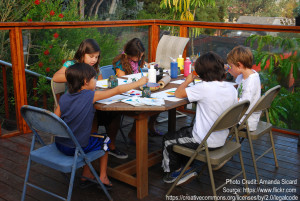Summer break has already started. Kids are at home most of the time which is quite challenging for parents to keep them busy. So as a solution, they enroll them to various summer camps and extra-curricular activities. Extra-curricular activities give the kids a chance to explore a different area. There are so many extra-curricular activities that can make our head spin. Today our children are busier than ever. So, the question is how to decide on these activities for our kids?
- First and very important thing to consider is: Try to look at each of our children as individuals, and to determine what each of their natural strengths and interests are – and then to find activities that support those. When these activities matches their interests rather than the ones they are persuaded to do by their parents, children are more likely to enjoy them.
- Think out of the box: Setting up a Lemonade Stand, raising money for some organization , doing a bake sale can be a very good initiative to let the kids know about leadership, team work, taking responsibility in a fun way.
My daughter had set up a lemonade stand with two of her other friends and when she came home after the sale, that satisfaction on her face was different. 🙂
- Is it worth enrolling in it?: Just because some other kid is going or the brochure looks appealing, that doesn’t mean that your kid has to go. Talk to your friends, get more information.
- Purpose: What is the purpose for joining that particular class? Is it temporary or are you going to continue it later too? Answering this question will help you decide on next two points.
- Financial Aspect: The activity classes are quite expensive. How much do they cost? Is it really worth spending that many dollars? Another thing to consider is the Commute time: There is no point is driving miles just for one class.
- Let your child explore a new hobby: Summer break is the best time to try out something new. Let it match to your child’s area of interest.
Keeping the same idea, let’s see what Serena Dhukka has written in her piece. For this week’s post, I had the above topic in mind. And what a coincidence that I got this nice writing piece from Serena Dhukka. Serena is an Elementary School teacher. She enjoys the time that she get to spend with her students. After reading her piece, I decided to include it in my weekly post.
“As an educator, I can say the most important liaison to a student’s success is the one a
parent and teacher hold. We have a common goal, which is to see growth within a child. Not only academically but also with any interests’ students may have. This past year, in my second grade classroom, I was able to identify an extracurricular interest of every student. I enjoyed the conversations based on the interests which in turn built a trust between the educator and student. The support shown by the parents towards the students’ interests, was something unheard of. I assumed the competition of being the best student would overcome the student’s individuality. It was so refreshing to hear parents speak about their child’s achievements outside of the academic range. Extracurricular activities build towards the student’s identity and allow them to show skills of achievement beyond the classroom. I look forward to reconnecting with my, now, third graders to see how they’ve progressed. – Serena Dhukka”
- Don’t overdo it: Don’t feel like you have to do it all. Set some guidelines, and let those extra-curricular activities work for you. No doubt, there are many benefits in activities beyond the realm of academics, but where is the line? How much is too much when it comes to extra-curricular?
- Let them enjoy their free time: There is nothing wrong with allowing them to spend one afternoon a week watching television or engaging in other unstructured free play that teaches children to entertain themselves without the presence of other people or doing something together as a family. May be a spending time on beach.



